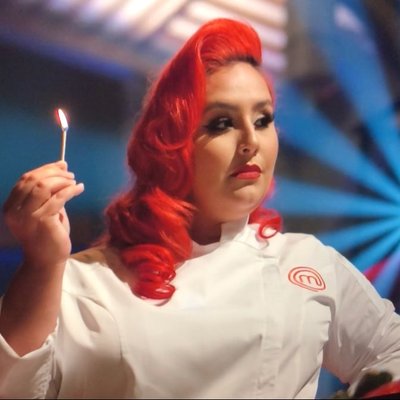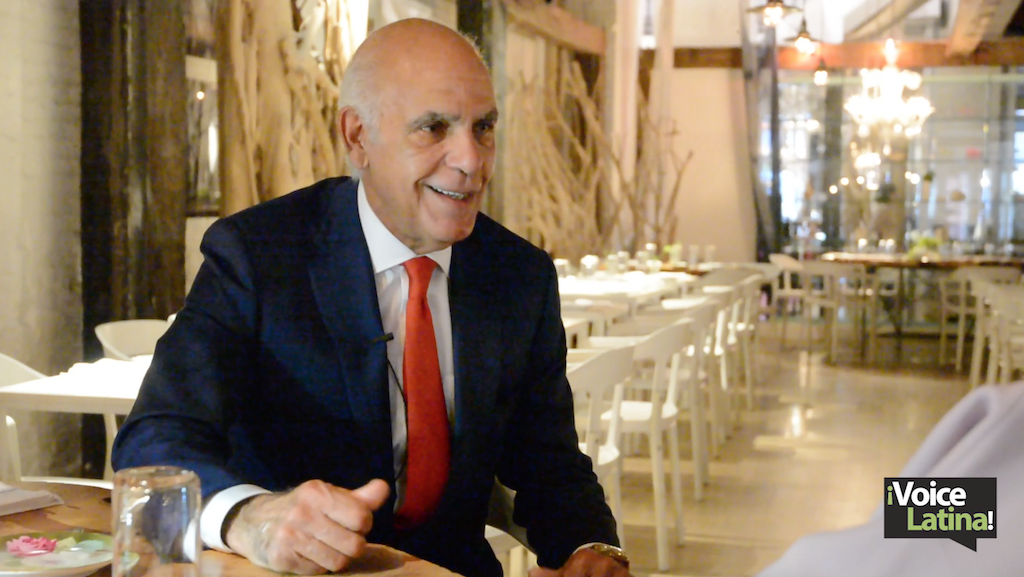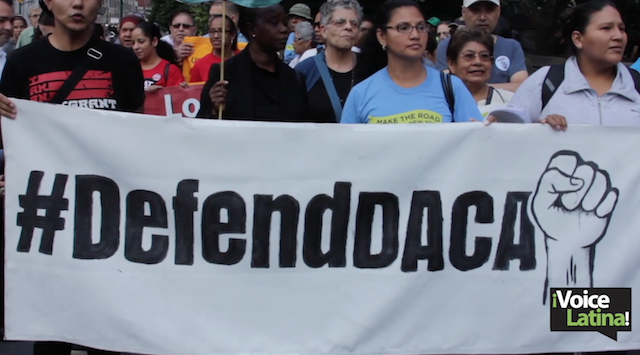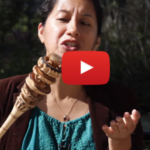
Recipe for success.
She started out as an amateur home cook and ended up a Master Chef. Claudia Sandoval, winner of the sixth season of MasterChef U.S. and the first Latina to win the coveted title, started her season with a fierce rallying cry, “This Latina is on fire!” and then proceeded to beat out 40 competitors one by one through a series of challenging elimination rounds. Her main ingredients, a relentless drive to achieve her dream and a dollop of passion, helped her serve winning dishes she describes as a modern take on Mexican coastal cuisine. Her food garnered raves from all three chef judges – Gordon Ramsey, Christina Tosi, and Graham Elliot, who was so inspired by one of Sandoval’s dishes, he couldn’t help but ask for “uno mas, por favor?”
Now Sandoval finds herself on the other side of the table as she joins fellow chefs Benito Molina and Ennio Carota as judges of Telemundo’s new series MasterChef Latino which premieres January 14 and is hosted by Mexican telenovela actress, model, and singer Aracely Arámbula. MasterChef Latino will be the first time the format comes to U.S. Hispanic television.
Patricia Sierra-Sampson: You are the Season 6 winner of MasterChef U.S. and now you are on the other side of the table as a judge on Telemundo’s new MasterChef Latino series. Two different experiences. Can you tell us about how you prepared to be a contestant versus how you prepared to be a judge this time around?
Claudia Sandoval: It varies vastly. Preparing for a cooking show competition as a contestant is significantly different. There you are trying to make sure you have a number of recipes in your back pocket that can be easily adapted or changed in order to fit within the 30 or 45 or 60-minute window that is given to you. This includes choosing your ingredients, expanding the menu, cooking everything and then plating everything. On the flip side, as a judge, I am determining who is growing, who is really intent on truly being a professional, who works like a professional.
One of the biggest things for me is that I wanted to be very sensitive which is very important to this whole process, being respectful knowing not only ingredients but recipes and foods specific to all Latin cultures which is very hard. I don’t think many people truly understand the complexity and various amounts of different recipes and types of dishes that exist across the many countries of Latin America. That was my biggest challenge going into this – making sure I knew as much as I could. This meant I needed to eat a lot! This was delicious but my waistline hated me! I already had a very good knowledge of Caribbean culture because I had friends that are Puerto Rican, Dominican, and Cuban. I wasn’t so clear on the South American countries. Trying to understand what they call something that perhaps is named differently like a caldo de rez in Mexico but when you go to Colombia it is called a cazuela. Being able to really know and understand the difference between a tamale and a pastel and how one is savory and one is sweet. All those variances. Learning those types of things was what made me really want to do my due diligence.
PSS: There is so much pressure on the contestants since they have such limited time and do not know what ingredients will be thrown at them. One thing I noticed about you as a contestant was your composure. You may have been nervous, but I never saw it as a viewer. What advice can you give contestants as they embark on this journey?
CS: I think composure is one of them. Keeping your head and your feet firmly planted is definitely a big one since it allows you to think clearly. So much of being in the competition is thinking on your feet. Making the right decisions. The most fundamental thing is to stay humble. What may have set me apart from the other contestants in my season was my ability to take the criticism that the judges were providing everyone, not just me. All of the critiques. Incorporating this into my cooking and how I was plating and presenting dishes. All of those things were valuable. So often because we are creatures of habit we stick to what we know. If you want to grow as a chef, you will be forever learning and growing. A true chef knows that they know nothing. There will always be someone who is better than you. Always. There will always be someone who has done it more times, has done it faster. It is fundamentally important when you go into a competition like this you have to be willing to learn. What is going to happen through the course of the program is you will go from being a regular home cook to becoming a professional and the only way you are going to achieve this is through listening and learning.
PSS: You speak with such passion; can you define when or is there someone in the familia that inspired this love of cooking? When did this all start for you?
CS: It started many, many years ago. Thirty years ago, when I was four years old and my mom put me in the kitchen. She taught me the family recipes so they didn’t get lost. I took this very much to heart. Maybe it was already in my blood, because I have grandmothers and aunts all over Mazatlán and Tijuana who had restaurants. I remember tomatoes and jalapeños roasting on the comal (flat griddle). I literally remember this as my first memory of cooking. I will always remember that first burn from trying to cook something. From a very young age, I was very lucky to have my grandmother, who is really my great aunt who raised my mom. My grandma taught me early on and showed me everything. These are the kind of people I was raised around, people who took cooking very seriously.
PSS: You have a beautiful young daughter who was born here in the U.S. and you as well were born and raised in San Diego – you’re a Cali girl – your family is from Mexico. How will you be passing on your cultura to this new generation?
CS: I think food is paramount. Anyone who thinks about Latinos and doesn’t think food, well, I just don’t know! Latinos are always talking about food, making food, hanging around food. I can’t think of a party where the first conversation doesn’t start with, “What are we making?” This is just the way that we function. I recently was on a local TV show where my daughter and I were showing how to make tamales. The anchor asked my daughter, “Do you know how to do this munchkin?” My daughter is 12 years old and she proceeded to teach the anchor how to do it. It was one of my proudest moments! At the end of the day for me, I don’t necessarily want her to be a chef, I want her to follow her dream. Whatever it may be. My lesson for her is not how to cook. The biggest takeaway when she grows up is she remembers her mom had a dream and she went after it. So, if her mom can do it, there is no reason why she can’t. There will be no “I don’t know if I can do it” it is not an option. She knows her mom went after her dream even when folks thought it was irresponsible. We sacrificed a lot. We spent a lot of time away from each. When she is older and with children of her own, she will know how important that sacrifice was and how hard her mom worked to make her dream come true.
PSS: On MasterChef Latino, you are working alongside two great chefs, Ennio Carota and Benito Molina, what is it like working with them, and what sets each of you apart from one another?
CS: We are all very different for sure. Benito is very truly Mexican. Not that I am not Mexican. Anyone that knows me knows that I am very Mexican-American, I am totally through and through a Chicana. Benito is a very straightforward, shoots straight from the hip kind of guy. Ennio Carota is a very comical, very sassy man. He has the Italian charisma; he’s charming through and through. He speaks perfect Spanish. It is funny because you often see us bantering back and forth or teasing each other. It was a lot of fun working with them because they are really funny. We didn’t always agree on everything so you are going to see us fighting now and then. That’s what truly makes it honest. This is reality TV. It’s not scripted, it’s what happens in the moment.
PSS: If you were in culinary heaven and you could have any food at all, what would be your choice for a perfect meal?
CS: My mom’s tostadas! I rarely get her to make them for me since they take so long to make. If it was my last meal on Earth, it would have to be her tostadas. I love them!
PSS: Are there any childhood favorite dishes that are still your go-to dishes today?
CS: At least once a week, I will make some of these dishes. Especially caldo (soup), a favorite is caldo de rez or albondigas. There’s always soup in the house. Another dish would be chiles rellenos – it was my favorite pregnant meal when I was expecting my daughter. And, of course, ceviche which I have at least once a week.
PSS: If you had anyone famous you could cook for, who would that be and why?
CS: That’s hard! I already cooked for my idol, Gordon Ramsey! I don’t know! I guess Mariah Carey, my childhood idol since I was nine. I just love her! If he hadn’t passed away, it would have been Juan Gabriel, my all-time favorite. I would have loved to cook for him. I am sure he would have been an incredible person to cook for and spend time with.
Chef Claudia Sandoval owns a successful culinary consulting and catering company, “Claudia’s Cocina” (http://www.chefclaudiascocina.com), in addition to working with important brands and publishing the bestseller “Claudia’s Cocina: A Taste of Mexico” in 2016.
MasterChef Latino is a production of Endemol Shine Latino for Telemundo. Air Date: Sundays on Telemundo (8-9 p.m. ET); Series Premiere: Sunday, Jan.14 (8-9 p.m. ET)







0 Comments